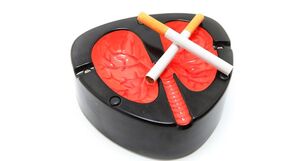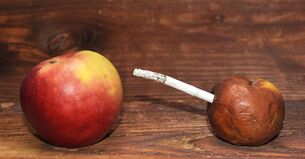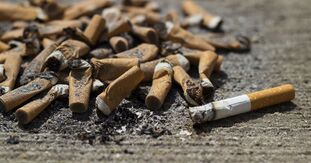Everyone is aware of the harmful effects of smoking, but not all of them are related to the mechanisms of recovery and recovery without a bad habit. It is an understanding of all the processes that take place in the body that can play an additional motivating role in the fight against nicotine addiction. Think about how this happened and what causes you to give up smoking and what you can do to make it as easy as possible to get rid of the addiction.
What happens to the body when you quit smoking?
Stopping smoking before the onset of irreversible pathological processes can restore a person's health, albeit for a long time. Even after a short but regular use of tobacco products, it takes 5 to 10 years for the body to fully recover. However, the first signs of an improvement in performance may appear after a few days.

To do this, try to write down all the feelings that arise when quitting smoking. By keeping a daily smoking cessation diary, you can be sure of all the changes that occur daily. It's also a way to motivate yourself by celebrating every local success in this challenging endeavor.
Next, we will explain to you in more detail how all organs and systems are restored.
How does the condition of the internal organs change?
Complete cessation of smoking has a beneficial effect on the human body, but not all changes can be seen with the naked eye. Let's look at some of them:
- Blood pressure decreases, the risk of myocardial infarction decreases several times.
- The walls of blood vessels are strengthened, the organs are enriched with oxygen.
- The bronchi heal, the lungs are cleared of viscous sputum - it is easier to breathe, shortness of breath and nervous cough disappear.
- The risk of developing cancer, including lung cancer, which is the most common type of this disease, is reduced.
- Sense of smell and taste buds are restored.
- The liver is cleansed after prolonged exposure to toxins.
- The risk of sudden death is reduced by 10 times.
This is only the main part of what happens after quitting smoking, because almost all smokers get rid of the toxins and carcinogens in tobacco smoke.
External changes in the body after quitting smoking
Women are most interested in what happens when you quit smoking with your appearance. We hasten to answer that a non-smoking life will bring only positive changes in your appearance. Visual development can be seen in 4-6 weeks. First of all, the skin becomes healthier, loses its gray color due to the fact that toxins no longer enter the body and the blood is saturated with oxygen. Teeth whiten significantly without being affected by the resin in tobacco products. The yellowish tones that accompany every smoker disappear from the fingers.
Teeth whiten significantly without being affected by the resin in tobacco products. The yellowish tones that accompany every smoker disappear from the fingers.
After 6 months, women notice that the hair follicles become stronger, resulting in a reduction in hair loss and an improvement in their appearance. Without exposure to resins and toxins, the body's skin improves thanks to the production of natural collagen, which prevents it from smoking.
Quit smoking: what happens to the bodies of a man and a woman
Human reproductive function suffers from smoking no less than the cardiovascular system or lungs. However, timely cessation of smoking will protect the health of women and men. Thus, in addition to the general development, women can observe the following changes in the body after quitting smoking:
- Normalization of hormonal levels, because the toxins in tobacco smoke negatively affect the balance of hormones in the female body.
- Improve the condition of the facial skin and reduce the risk of premature aging due to the normalization of collagen production.
- There is a high probability of getting pregnant and carrying a healthy baby.
For men, breaking a bad habit will improve their sexual performance. This is due not only to the increased power to increase the duration of sexual intercourse, but also to the ability to reproduce healthy children.
The most common negative consequences of quitting smoking
Most people who try to get rid of their nicotine addiction first notice negative changes, not positive ones. This is not surprising, because a person develops withdrawal syndrome from the cessation of nicotine intake - a kind of withdrawal. To find out what to prepare for, take a look at what happens after you quit smoking:
- From the nervous system: increased nervousness, decreased concentration, depression, anxiety, sleep quality or insomnia, general weakness and fatigue.
- From the digestive system: nausea, sharp increase in appetite, stomach pain.
- By the respiratory system: increased cough with dark sputum discharge.
- On the ENT organs: sweating or a "round" feeling in the throat, nasal congestion, small runny nose.
All of these symptoms can be minimized by supporting your body.
How is immunity protected in the body?
The immune system responds immediately to changes associated with the cessation of nicotine intake, and in most early stages this reaction is the opposite of what is expected. Therefore, it is often argued that I have not smoked for a month and that I get sick more often than when I smoke. Former smokers are more susceptible to various viruses and take any one easily, which is associated with the rebuilding of the body. Therefore, measures should be taken to strengthen the immune system. Thus, during the withdrawal from tobacco products, doctors recommend taking multivitamin complexes that balance all the necessary vitamins and trace elements.

In addition, traditional medicine prescriptions are no longer available in this situation. Echinacea tincture, ginseng, honey and green tea with lemon will be a useful helper.
Please note that it is not recommended to take medication to break a bad habit.
How to help the lungs?
The lungs and bronchi are especially affected by tobacco smoke, so you need to help clear the thick mucus as soon as possible. To do this, you need to consume plenty of fluids. Straight still water is ideal. Also pay attention to the humidity in the house. Dry air is known to inhibit productive coughing and thus slow down the cleansing process.
Herbs and syrups based on them are a good alternative to synthetic mucolytics. A budget and effective choice is licorice root syrup. You can also use a mixture of lung corn, horsetail, plantain, elecampane and corn in the form of tea. Thus, when you quit smoking, the changes in the body, ie the organs of the respiratory system, will continue with minimal discomfort.
How to get rid of bad habits in the first month?
The most negative reaction a former smoker feels to himself is the nervous system. Thus, almost everyone notes a depressive, and in some cases even depressive state. If we think about what happens when you quit smoking every day, it is the nervous system that suffers the most in the first place.
As mentioned above, it is highly undesirable to take medication while quitting smoking, but this rule does not apply to sedatives that can effectively combat increased mental stress. However, the drug should be used only under the direction of a physician.

Herbal enthusiasts should infuse soothing herbs such as mother corn, mint, valerian as a tea or take them in tablet form.
What can you do to prevent smoking from gaining weight?
Special attention should be paid to the diet so that the changes that occur after quitting do not affect body weight. Weight gain is a result of increased appetite, and if you do not take this issue seriously, you can gain a lot of weight. It is a fact that often frightens women who smoke, forcing them to give up the idea of quitting a bad habit.
During the withdrawal period, a diet rich in vegetables and fruits should be included in the diet. Fiber is excellent at quenching hunger and will allow you to feel full for a long time. You should also avoid the use of spicy and fatty foods, as well as be careful with sweets and pastries. The same can be said of lollipops and seeds, many of which are replaced by cigarettes. They should prefer apples, carrots or a glass of clean water.
What happens when you quit smoking every day?
The first results of the fight against addiction can be felt by a person in the first days. Moreover, the most frequently expressed during this period are negative reactions, which, like the positive ones, should be included in the smoker's diary (if any) in order to get a general picture, strengthen the spirit and understand what is going on and not broken. So what is the risk of quitting during the day:
- 1 day: appetite is disturbed, there is apathy.
- Day 2: Irritability may appear, insomnia may appear.
- Day 3: The urge to smoke is especially strong.
- Day 4: Cough intensifies with sputum discharge.
- Day 5: There is a constant feeling of hunger.
- Day 6: Depressive condition may develop.
- Day 7: Withdrawal syndrome gradually recedes.
At the same time, heart rate and blood pressure stabilize, the risk of heart attack decreases, the sense of smell improves and the organs are saturated with oxygen.
Changes in the body within a month or a year after quitting smoking
For a smoker, daily results for the body are the beginning of a long recovery process that lasts several years. However, it is the first year of the most productive, because it is during this period that the maximum changes occur, which are reflected not only in appearance, but also in the general condition of the former smoker:
- The volume of the lungs increases, increased fatigue and shortness of breath during exercise.
- Smoking is eliminated, both physically and psychologically.
- The risk of developing cardiovascular disease is significantly reduced.
- Skin looks more attractive, prevents premature aging.
- Hair becomes brighter, nails become stronger.
- Affected liver cells are restored.
- Cough and choking disappear.
At this stage, we can say with confidence that the dependence is eliminated.
What is the best way to shoot sharply or gradually?
This is a question that often arises among smokers with different experiences. There is an idea that it is worth fighting your addiction for the duration of your addiction. However, most doctors believe that reducing tobacco use will not have a positive effect. For this reason, the smoker's habit does not disappear, and the body continues to require nicotine. Therefore, the best solution would be a complete and decisive abandonment of tobacco products. Although the smoker on the road faces the difficulties described above, in the end the most valuable thing - will protect health.

However, there are some cases where breaking away from addiction does not work suddenly. This applies to heavy smokers who consume an average of 1. 5-2 packs per day. At the same time, it is necessary to try to reduce the amount of smoking methodically until it stops completely within a month.
As you can see, it will be a big obstacle to a healthy, nicotine-free life. The key is to understand that everything is temporary and to set yourself up so that these temporary difficulties will not allow you to retreat, regardless of your main goal - nicotine.























